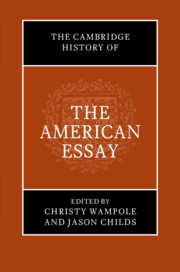Book contents
- The Cambridge History of the American Essay
- The Cambridge History of the American Essay
- Copyright page
- Contents
- Acknowledgments
- Notes on Contributors
- Introduction
- Part I The Emergence of the American Essay (1710–1865)
- Part II Voicing the American Experiment (1865–1945)
- Part III Postwar Essays and Essayism (1945–2000)
- Part IV Toward the Contemporary American Essay (2000–2020)
- 31 The American Essay Film: A Neglected Genre
- 32 Literary Theory, Criticism, and the Essay
- 33 Gender, Queerness, and the American Essay
- 34 Disability and the American Essay
- 35 The Radical Hybridity of the Lyric Essay
- 36 Writing Migration: Multiculturalism, Democracy, and the Essay Form
- 37 Latinx Culture and the Essay
- 38 Black Experience through the Essay
- 39 The Essay and the Anthropocene
- Recommendations for Further Reading
- Index
39 - The Essay and the Anthropocene
from Part IV - Toward the Contemporary American Essay (2000–2020)
Published online by Cambridge University Press: 28 March 2024
- The Cambridge History of the American Essay
- The Cambridge History of the American Essay
- Copyright page
- Contents
- Acknowledgments
- Notes on Contributors
- Introduction
- Part I The Emergence of the American Essay (1710–1865)
- Part II Voicing the American Experiment (1865–1945)
- Part III Postwar Essays and Essayism (1945–2000)
- Part IV Toward the Contemporary American Essay (2000–2020)
- 31 The American Essay Film: A Neglected Genre
- 32 Literary Theory, Criticism, and the Essay
- 33 Gender, Queerness, and the American Essay
- 34 Disability and the American Essay
- 35 The Radical Hybridity of the Lyric Essay
- 36 Writing Migration: Multiculturalism, Democracy, and the Essay Form
- 37 Latinx Culture and the Essay
- 38 Black Experience through the Essay
- 39 The Essay and the Anthropocene
- Recommendations for Further Reading
- Index
Summary
This chapter begins with varying definitions of the Anthropocene and articulates the ways in which essayists have responded to the environmental destruction, contamination, reshaping of the earth’s surface, and exhaustion of shared resources represented by this new geological epoch. In these types of essays, science writing meets nature writing, activism meets lyricism. The essay has always been a space for ethical reflection, and those essays featured in this chapter – by writers such as Robin Wall Kimmerer, Barry Lopez, Camille Dungy, Donna Harraway, Fred Moten, and Christina Nichol – ponder the ethics of the violence that is part of our new environmental status quo. The chapter also investigates the relationship between the Anthropocene and various bleak contemporary and historical realities: the trans-Atlantic slave trade, colonization, appropriation of land, extraction of resources, genocide, and dispossession.
Keywords
- Type
- Chapter
- Information
- The Cambridge History of the American Essay , pp. 668 - 682Publisher: Cambridge University PressPrint publication year: 2023



